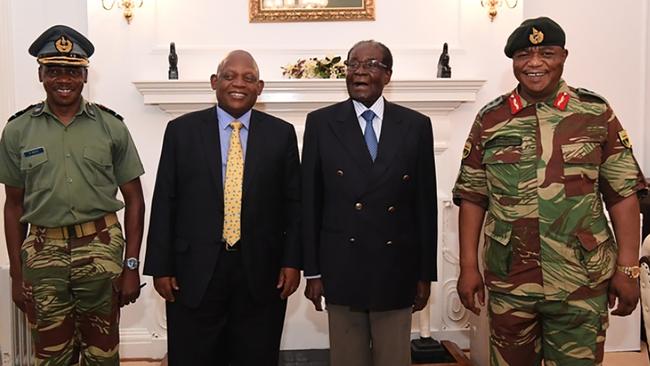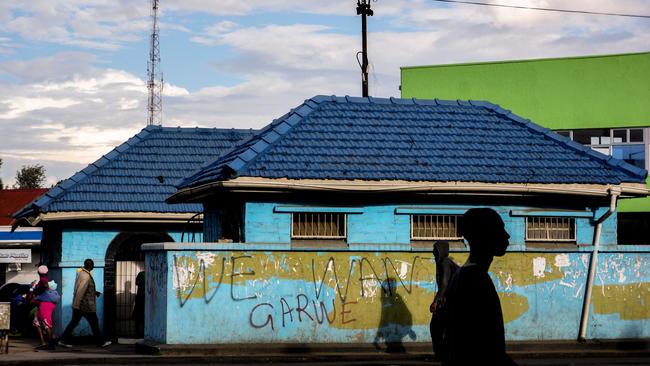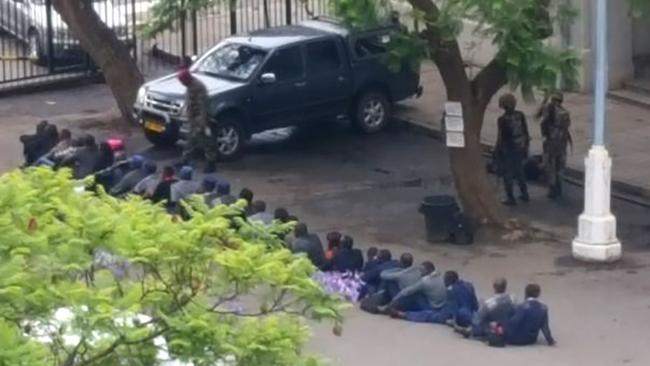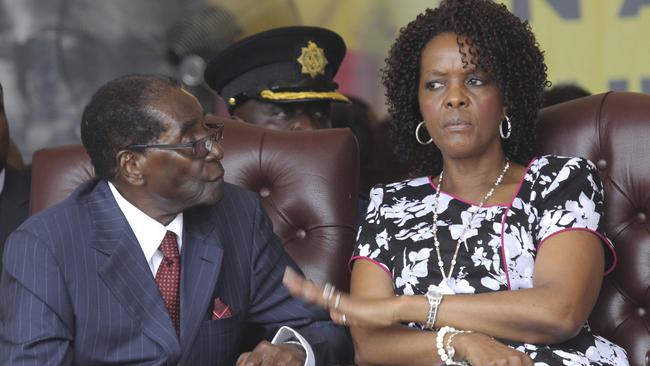I’m still the boss: Robert Mugabe digs in after military coup
A smiling President Robert Mugabe has met Zimbabwe’s military chief, creating more confusion about the nation’s future.
A smiling President Robert Mugabe was pictured shaking hands with Zimbabwe’s military chief a day after the army seized power, throwing confusion over predictions that the 93-year-old’s nearly four-decade rule had come to an end.
Mugabe unexpectedly drove from his lavish “Blue Roof” compound in Harare, where he had been confined since troops took to the streets, to State House, where official media pictured him meeting military chief Constantino Chiwenga and South African ministers sent to mediate the crisis.

The official Herald newspaper carried no reports of the outcome of the meeting, leaving Zimbabwe’s 13 million people in the dark as to what was happening as night fell.
Mugabe is insisting he remains Zimbabwe’s only legitimate ruler and is refusing to quit, but pressure was mounting on the former guerrilla to accept offers of a graceful exit.
Earlier, a political source who spoke to senior allies holed up in the compound with Mugabe and his wife Grace said he had no plans to resign voluntarily ahead of elections due next year.
The army’s takeover signalled the collapse in less than 36 hours of the security, intelligence and patronage networks that sustained Mugabe through 37 years in power and built him into the “Grand Old Man” of African politics.
A priest mediating between Mugabe and the generals, who seized power on Wednesday in what they called a targeted operation against “criminals” in Mugabe’s entourage, has made little headway, a senior political source said.
Opposition leader Morgan Tsvangirai called for Mugabe’s departure “in the interest of the people”.
The army may want Mugabe, who has ruled Zimbabwe since independence in 1980, to go quietly and allow a smooth and bloodless transition to Emmerson Mnangagwa, the vice president Mugabe sacked last week triggering the political crisis.
The main goal of the generals is to prevent Mugabe from handing power to his wife Grace, 41 years his junior, who has built a following among the ruling party’s youth wing and appeared on the cusp of power after Mnangagwa was pushed out.
The last of Africa’s state founders still in power from the era of the struggle against European colonisation, Mugabe is still seen by many Africans as a liberation hero. But he is reviled in the West as a despot whose disastrous handling of the economy and willingness to resort to violence to maintain power pauperised one of Africa’s most promising states.
South African President Jacob Zuma dispatched his defence and state security ministers to Harare. They were expected to meet Mugabe and the military.
It was reported by the Zimbabwe Mail that Tsvangirai had returned to Harare for a possible place in a transition government. A South African news agency reported Mugabe had agreed to quit in exchange for his wife’s safe passage to South Africa.

The Southern African Development Community was to hold an emergency meeting in Botswana last night.
The military said on Wednesday it had launched a targeted operation against “criminals” in the Mugabe entourage.
Kudzai Chipanga, leader of the ruling ZANU-PF’s youth league, apologised for criticising army chief Constantino Chiwenga following the general’s threat to intervene against Mugabe.
“I kindly request General Chiwenga to please accept my apologies on behalf of the youth league and myself. We are still young people, we are still growing up. We learn from our mistakes,” he said.
South Africa, the US, EU, the UN and Britain all called for restraint. British Foreign Secretary Boris Johnson warned against handing power “from one unelected tyrant to the next”. Mr Zuma called for “calm and restraint” and asked the military “to ensure that peace and stability are not undermined in Zimbabwe”.

The South African presidency said Mugabe had told Mr Zuma in a phone call that he was confined to his home but was otherwise fine and the military said it was keeping him and his family safe.
Mugabe plunged Zimbabwe into a fresh crisis last week by sacking his vice-president and presumed successor, Emmerson Mnangagwa, 75 — known as “the crocodile” — for showing “traits of disloyalty”.
The generals believed that move was aimed at clearing a path for Grace Mugabe to take over. General Chiwenga said on Monday they were prepared to “step in” if purges of their allies did not end.
After his sacking, Mr Mnangagwa fled to South Africa and published a scathing, five-page rebuke of Mugabe’s leadership and Grace political ambition.

A Zimbabwean vice-president who was fired in 2014, Joice Mujuru, called for “free, fair and credible elections” following a transition arrangement that draws from a range of communities. Peace can be realised only “through maximum restraint”, she said.
The pastor whose #ThisFlag campaign last year led to the largest anti-government protests in a decade called on citizens to “stand up for peace. Should we just sit and wait or shall we at least be part of this transition process?” Evan Mawarire asked, urging citizens not to wait for regional leaders to broker the next phase.
Across the country, Zimbabweans were enjoying freedoms they haven’t had in years.
The shift to military control brought a kind of fresh air. For once, Zimbabweans weren’t contending with bribe-seeking police officers who mounted roadblocks every few kilometres.
Soldiers manning the few checkpoints on roads leading into downtown Harare greeted motorists with smiles, searching cars without hostilities.
Street vendors who endured police raids after Mugabe ordered their removal were working without hassles. Trade unions urged workers to go about their business
AFP, Reuters, AP
ZIMBABWE TIMELINE
Key dates in Robert Mugabe’s 37-year rule, one of the longest on the African continent
From Rhodesia to Zimbabwe
April 18, 1980: Rhodesia gains independence after 90 years as a British colony, taking new name Zimbabwe. The 1972-1979 war of independence between nationalist black people and the minority white regime led by Ian Smith has left 27,000 dead. Robert Mugabe, head of the Zimbabwe African National Union (ZANU), takes power as prime minister. Joshua Nkomo, head of the Zimbabwe African Peoples Union (ZAPU), Mugabe’s partner in the armed struggle, becomes interior minister.
February 17, 1982: Nkomo, accused of plotting a coup, is dismissed. Armed resistance in his stronghold of Matabeleland is met with bloody government repression. At least 20,000 die.
December 30, 1987: Mugabe becomes head of state after reforming the constitution to usher in a presidential regime. Two years later rival movements merge to become the Zimbabwe African National Union-Patriotic Front (ZANU-PF).
White farms seized
February, 2000: Start of a violent campaign of seizure of white farms by squatters and pro-Mugabe war veterans. More than 4,000 of the 4,500 white farmers are stripped of their land, with the support of the regime, with the official goal of correcting inequalities dating back to the colonial era.
Mugabe hangs on
March 2002: Mugabe is re-elected president in a poll marred by violence and widely denounced as rigged. Western sanctions are imposed.
March, 2008: ZANU-PF is defeated by tMorgan Tsvangirai’s Movement for Democratic Change (MDC) in parliamentary polls. Tsvangirai wins the first-round presidential vote, but withdraws from the second round, citing violence against his supporters. Mugabe is inaugurated for a new term.
August 2013: Mugabe is declared re-elected in July 31 elections with 61 percent of the vote, against Tsvangirai’s 34 per cent. Tsvangirai describes the election as a “huge farce” and “null and void”. The EU, however, starts normalising relations with Zimbabwe, lifting most of its sanctions.
Purge
December 6, 2014: Mugabe names his 49-year-old wife Grace as head of the ruling ZANU-PF party’s women’s wing. He then seeks to quell infighting over his successor by purging his foes.
April 14, 2016: MDC gathers more than 2,000 demonstrators in Harare in the biggest march organised for a decade against Mugabe.
September 24, 2017: Activist pastor Evan Mawarire is arrested after he posts a video bemoaning the country’s worsening economic troubles.
November 6: Mugabe fires Vice President Emmerson Mnangagwa, long considered his probable successor, who has close ties to the military and the powerful independence war veterans. He flees the country.
November 13: Army chief General Constantino Chiwenga demands a “stop” to purges and warns the military could intervene.
November 14: Several tanks are seen by witnesses moving near Harare.
November 15: Military announces that Mugabe “and his family are safe and sound.” Declares it is only “targeting criminals around him who are committing crimes” and insists this is not a military takeover. Military vehicles block road outside parliament and are deployed near ZANU-PF offices.
AFP






